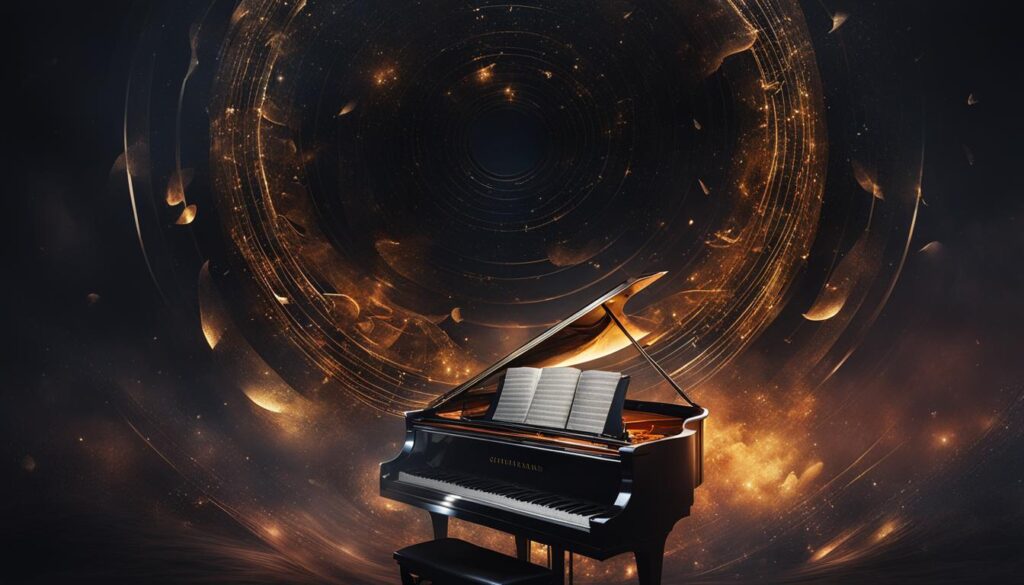Epic music has the capability to transport listeners on a remarkable journey through its powerful compositions and grand soundscapes. Encompassing large orchestras, intense sounds, and majestic melodies, the world of epic music offers an unforgettable experience for those who venture into its realm. In this article, we embark on a journey to explore the origins, characteristics, and contemporary landscape of this awe-inspiring genre.
Key Takeaways
- Epic music is characterized by its vast, powerful soundscapes and strong emotional impact
- The genre has deep roots in classical music, with iconic compositions laying the groundwork for what epic music would become
- Modern epic music has found a home in film scores and video game soundtracks, amplifying the emotional weight of narratives in these mediums
- Characteristic elements of epic music include full orchestras, dramatic melodies, and powerful brass sections
- A variety of sub-genres and experimentation has led to a rich diversity within the world of epic music
Unveiling The Grandeur Of Epic Music: An Introduction
Epic music is a powerful genre that captivates listeners with its substantial orchestral foundations, dramatic usage of choir and instrumentals, and its ability to convey powerful, evocative narratives through sound. Often associated with cinematic soundtracks, epic music has become the backdrop for many of history’s most iconic and emotional scenes in film and media. The grandiosity of this genre lies in its mesmerizing blend of instrumental music, emotional melodies, and thrilling soundscapes that transport listeners to other worlds and tell stories beyond words.
“Epic music is not just about grand sounds and powerful orchestrations; it’s about creating a universe of emotions and stories through the power of melody and harmony.”
There is an array of classic examples showcasing the thrilling nature of epic music within cinema. Ranging from the unforgettable scores of the Lord of the Rings trilogy to the heart-pounding soundtracks of Interstellar and Inception, the world of film has embraced the rich and vibrant tapestry of epic music to elevate its storytelling to new heights.
| Film | Composer | Iconic Epic Music Example |
|---|---|---|
| Lord of the Rings Trilogy | Howard Shore | The Bridge of Khazad-Dûm |
| Interstellar | Hans Zimmer | No Time for Caution |
| Inception | Hans Zimmer | Time |
| Gladiator | Hans Zimmer and Lisa Gerrard | Now We Are Free |
Although primarily linked with cinema, it is important to note that epic music transcends the realm of film, appearing in video games, television, and advertising as well. This genre, despite its inherent grandiosity, can connect with listeners on a deeply personal level, evoking strong emotions and creating an all-encompassing soundscape.
- Cinematic Soundtracks: From breathtaking adventures to intense drama, epic music enhances the emotional weight of on-screen stories and builds unforgettable moments.
- Instrumental Music: The poignant melodies and rich harmonies of epic music instruments create a stirring soundscape that speaks without the need for lyrics.
- Emotional Melodies: The power of epic music is its innate ability to tap into the emotional core of the listener and evoke deep responses that transcend words.
- Thrilling Soundscapes: Epic music envelops the listener in a sonic journey, painting vivid images and transporting them to worlds unknown.
In conclusion, epic music is a genre that continues to captivate audiences with its grandeur and emotional depth. Its powerful orchestral arrangements and sweeping melodies convey the emotions and strength of large-scale cinematic productions while simultaneously providing an immersive personal experience for listeners around the world.
The Historical Roots Of Epic Music: From Classical To Cinematic Marvels

Epic music has its origins deeply rooted in the world of classical music, with its grandiosity and an overwhelming sense of scale. Iconic compositions by composers such as Sibelius, Beethoven, Verdi, and Saint-Saëns laid the foundation for the genre we know and love today. As classical music continued to evolve, it found a new home in cinema, where film scores adopted its robust sound to create mesmerizing soundtracks for superhero movies, among others.
The Iconic Compositions That Defined The Genre
Several classical compositions can be considered the early exemplars of epic music. Sibelius’s ‘Symphony No. 5’, with its sweeping melodies and majestic orchestration, stands as a testament to the grandiosity inherent in classical music. Verdi’s ‘Aida’, a grand opera with massive orchestral demands, further showcases the genre’s propensity for the overwhelming sense of scale.
Beethoven’s ‘Symphony No. 9′ represents an early exploration into incorporating profound human emotions within a symphony, while Saint-Saëns’ ‘Organ Symphony’ showcases epic music’s immense sound potential.
“Music should strike fire from the heart of man, and bring tears from the eyes of woman.” – Ludwig van Beethoven
Tracing The Evolution From Symphony Halls To Film Scores
As epic music evolved from its classical origins, it adapted to a new medium that provided the perfect platform for its soaring melodies and powerful orchestrations: cinema. Film scores began to incorporate the rich, emotive qualities of classical compositions, resulting in some of the most iconic soundtracks in movie history.
- John Williams’s iconic score for ‘Superman’
- Howard Shore’s unforgettable compositions for ‘The Lord of the Rings’
- Hans Zimmer’s impactful soundtracks for ‘The Dark Knight’ and ‘Inception’
A prime example of the genre’s transition from symphony halls to movie screens is John Williams’s unforgettable score for ‘Superman’. With its bold French horn themes and evocative orchestration, it perfectly complements superhero narratives and cements the genre’s status as the backbone of modern epic music.
In the world of contemporary cinema, composers continue to draw inspiration from the likes of Brian, Rachmaninov, Tallis, and other classical greats to create epic orchestral tracks that resonate deeply with audiences and elevate the narratives they accompany.
Characteristics Of Epic Music: Understanding The Soundscape

Epic music is a genre characterized by a unique set of attributes, shaping the perception of this music style as powerful and emotionally charged. Its bold nature, accentuated by conservatoire-like orchestras, sophisticated melodic structures, and strong brass sections, forms an experience that evokes adventure and heroism. An examination of the vital components of epic music helps to understand the anatomy of this dynamic soundscape.
- Orchestral music: Full symphonic orchestras, often accompanied by grand choirs, form the backbone of epic music compositions. These massive orchestral arrangements provide the scale and depth necessary to create the genre’s signature larger-than-life sound.
- Dramatic music:Permeating the genre is a sense of high drama that comes from its grandiose compositions, conveying a sense of conflict, victory, or heightened emotion. Sweeping musical peaks and valleys embody epic music’s storytelling prowess.
- Heroic music:The imagery of titanic battles and grand quests is ingrained in the fabric of epic music, with its soaring melodies and powerful rhythms designed to inspire feelings of courage, resilience, and triumph in listeners.
- Elaborate melodic structures:Epic music compositions are replete with intricate melodies and harmonic progressions that showcase the skills of avid composers and arrangers, deftly weaving multiple themes and variations to create a sense of complexity and richness in sound.
“Epic music is about the journey, not just the destination, and it’s that journey that touches us emotionally and moves us at our core.”
– A renowned epic music composer
A grasp of these core characteristics of epic music enables a deeper appreciation for the genre’s vast array of powerful compositions. Whether it’s a pulse-pounding battle cry or a sorrowful requiem, the numerous sonic elements in play allow for a captivating and memorable listening experience.
Epic Music In Modern Media: Impact On Film And Gaming

In today’s entertainment landscape, epic music has become a defining element of both blockbuster movies and video games, adding a layer of emotional depth and grandeur that elevates these mediums to new heights. Its powerful orchestral music and rich cinematic soundtracks have made it an essential component of the storytelling process.
The Role Of Epic Music In Blockbuster Movies
From Star Wars to Lord of the Rings, epic music has amplified the emotional weight of narratives in countless blockbuster movies. By creating a backdrop of resonant sound, it reinforces the storytelling and fosters an emotional connection with viewers that lingers well beyond the theater.
“I think cinema, movies, and magic have always been closely associated. The very earliest people who made film were magicians.” – Francis Ford Coppola
By merging powerful orchestral music with highly emotive melodies, epic film scores have become a core aspect of modern filmmaking. They not only enhance key moments of drama and action, but also build tension, inject an additional element of excitement, and fuel our imagination.
Scoring The Virtual Worlds: Epic Music And Video Games
Similarly, in the gaming industry, epic music plays an integral role in crafting immersive virtual worlds. The thematic layers and interactive scores of video game soundtracks have become cornerstones for enhancing the player’s experience, underlining the visceral nature of gameplay and helping to establish the tone and atmosphere of video games such as The Witcher 3: Wild Hunt or the Final Fantasy series.
- Composed soundtracks: These are the thematic music pieces designed exclusively to match a game’s narrative and creating a stunning aural landscape that oozes emotion and grandeur.
- Adaptive or interactive soundtracks: These soundtracks evolve with the player’s progress in the game, adjusting the music to the in-game situation, hence delivering a personalized and immersive experience.
With the ongoing advancements in technology, the integration of epic music into video games is becoming more sophisticated and immersive, allowing for seamless blending of visual and auditory elements to captivate players the world over.
| Film Series | Composer | Video Game | Composer |
|---|---|---|---|
| Harry Potter | John Williams | Mass Effect | Jack Wall |
| Pirates of the Caribbean | Hans Zimmer | God of War | Bear McCreary |
| Gladiator | Hans Zimmer | Horizon Zero Dawn | Joris de Man |
As we look forward to the epic music mix 2023, the impact of epic music on both film and gaming will continue to evolve, carrying on its legacy of delivering awe-inspiring cinematic soundtracks and unforgettable orchestral music mixes, redefining how we engage with modern media.
The Emotional Power Of Epic Orchestral Tracks

The true strength of epic orchestral tracks is found in their emotional resonance. The interplay between emotional melodies and powerful compositions effectively creates a harmony that moves listeners to feel every beat. This is achieved through the close interaction of strings, brass instruments, and percussive elements, which come together to form a melodious wave that captivates the audience.
One of the key factors that contribute to this emotional power is the creative arrangement of melodies, harmonies, and tonal balance in each track. The following are some of the essential elements that help in elevating the emotional impact of these compositions:
- Strings: The use of stringed instruments such as violins and cellos adds a delicate, emotional nuance to the composition by generating rich, expressive melodies.
- Brass: Brass instruments such as trumpets, trombones, and French horns contribute to the epic, triumphant feel of the music through their powerful, sonorous tones.
- Percussion: Finally, percussive elements bring a sense of drama and tension to the track by accentuating key moments and rhythm patterns.
By creatively leveraging these instrumental components, epic orchestral tracks succeed in evoking emotional responses in the listener, immersing them in a gripping narrative crafted by the melodies and harmonies.
“Our emotions are moved by the simultaneous effects of harmony, rhythm, and melody acting upon our senses to create a wonderfully rich and powerful form of storytelling.”
This inherent emotional capacity to orchestral music is further enhanced by the composer’s ability to manipulate thematic motifs, key changes, and accentuation techniques. By exploring the interconnectivity of sounds, emotions, and human experience, epic orchestral tracks can reach remarkable depths of emotional expression.
| Emotional Impact | Compositional Techniques |
|---|---|
| Triumph | Use of powerful brass melodies, ascending key changes, and dynamic crescendos |
| Sadness | Employing slow tempo, minor keys, and subdued string arrangements |
| Anticipation | Incorporating rhythmic tension through percussion, changes in time signature, and gradual build-up |
| Resolution | Combination of recurring thematic motifs, harmonic resolutions, and satisfying cadences |
As evident, the emotional power of epic orchestral tracks is rooted in the complex interplay of music, human emotions, and imagination. By skillfully blending an array of instrumental elements and compositional techniques, these tracks become vehicles for deeply captivating and emotionally resonant storytelling.
Creating Your Own Epic Music Experience: Playlists And Platforms

For music enthusiasts keen to embark on their own epic musical journey, curating an epic music playlist is a fantastic way to get started. In this process, you’ll want to select powerful compositions that cater to your unique mood and preferences for each day, ultimately making your listening experience that much more immersive and personal. As digital platforms continue to proliferate, listeners have more great options than ever before to quickly access epic music and seamlessly stream all their favorite tracks.
Crafting The Perfect Epic Music Playlist For Your Day
Building an epic music playlist that is tailored to suit your specific listening needs involves a thoughtful blending of various factors. Take into consideration the purpose of your playlist, whether that be for motivation, relaxation, or aural escapism. Besides listening to well-known epic music, don’t hesitate to explore undiscovered gems and new releases to keep your music mix fresh and engaging. Here are some tips to help you craft the perfect playlist:
- Select a theme: Choose a central idea or emotion that will guide your playlist’s direction and vibe.
- Consider the length: Aim to create a playlist that is long enough to satisfy your listening needs without being repetitive.
- Maintain a balance: Mix intensely powerful compositions with softer, more emotionally resonant tracks to keep things interesting.
- Organize your tracks: Arrange the songs in a logical and appealing order, creating a seamless flow throughout your musical journey.
The Best Channels And Platforms To Stream Epic Music
Ready to tap into a vast world of epic music? The following platforms and channels can help streamline your search for the very best epic music mixes and playlists.
| Platform | Features | Notable Channels / Playlists |
|---|---|---|
| YouTube | Free, user-generated content, customizable playlists, and high-resolution music videos. | Epic Music World, HDSounDI, ThePrimeCronus |
| Spotify | Premium and free accounts available, endless playlists curated by users and experts, diverse music library with a wide range of epic music options. | Best of Epic Music, Epic Film Music, Epic Instrumentals |
| Pandora | Ad-supported or ad-free listening options, customizable stations based on your preferences, variety of epic music channels. | Instrumental Epic Music, Epic Soundtracks |
| Apple Music | Premium subscription-based service, a vast library of epic music, and expert-curated playlists. | Epic Orchestral, Cinematic Scores |
Each platform offers a unique set of features and an extensive range of epic music playlists and channels to choose from. As you evaluate which platform best meets your needs and preferences, be sure to explore individual channel offerings and keep an open mind with respect to new releases and unique sounds. Happy listening!
Epic Music Genres And Variations: Exploring The Diversity
The epic music genre, known for its grandiose soundscapes, comprises a diverse array of sub-genres and variations, each offering unique interpretations that expand the traditional sound. This diversity enables a rich exploration of what constitutes “epic” across different cultural and musical landscapes. In this section, we delve into some notable epic music genres and variations, showcasing the breadth and depth of the genre.
- Cinematic Epic: Often associated with film scores, cinematic epic music features grand orchestral arrangements, stirring choir vocals, and powerful instrumentals. John Williams and Hans Zimmer are renowned composers in this genre.
- Orchestral Epic: Rooted in classical and romantic music traditions, orchestral epic music focuses on large-scale symphonic compositions, highlighting the use of strings, brass, woodwinds, and percussion to create intense, emotional melodies.
- Electronic Epic: This sub-genre combines traditional orchestral elements with electronic sounds, synthesizers, and digital effects, creating a modern, innovative soundscape. Composers like Thomas Bergersen and Audiomachine are pioneering this style.
- Ethnic Epic: Ethnic epic music incorporates traditional instruments, melodies, and rhythms from various cultures, resulting in a rich and diverse sonic tapestry. Globally acclaimed composers like Yo-Yo Ma and Ramin Djawadi have employed this approach in their works.
Beyond the genres mentioned above, various sub-genres and variations blend and reinterpret epic music’s core elements, leading to a dynamically evolving soundscape.
“Epic music is not a static genre. It evolves, adapts, and takes on various forms, depending on the artists and the eras. The exploration of epic music genres and variations allows listeners to discover new realms and possibilities beyond traditional boundaries.”
With each sub-genre and variation, epic music continues to extend its reach and appeal to diverse audiences, reaffirming its enduring allure and captivating essence.
Artists And Composers Who Are Defining Today’s Epic Music Scene
Today’s epic music scene is shaped by a number of trailblazing artists and composers who continue to push boundaries and experiment with new sounds and techniques. These talented individuals are further defining what epic music can be in the contemporary era, leaving a lasting impact and expanding the horizons of the genre. Here are some prominent names that stand out in the world of epic music:
- Hans Zimmer
- Audiomachine
- Two Steps from Hell
- James Newton Howard
- Ramin Djawadi
| Artist / Composer | Notable Work | Contribution to Epic Music |
|---|---|---|
| Hans Zimmer | Inception, The Dark Knight Trilogy, Interstellar, Gladiator | Zimmer’s iconic scores have become synonymous with epic music, combining orchestral grandeur with innovative electronic elements. His work has shaped the sound of modern film and influenced countless composers in the process. |
| Audiomachine | Chronicles, Helios, Worlds of Wonder | As a highly regarded production music collective, Audiomachine has delivered some of the most powerful and emotive epic music in recent years. They have supplied a broad range of projects, from film trailers to video games, with their unique and powerful compositions. |
| Two Steps from Hell | Invincible, Archangel, Battlecry | Founded by composers Thomas Bergersen and Nick Phoenix, Two Steps from Hell has emerged as a leading force in epic music. Their prolific output of albums and trailer music for blockbuster films showcases their exceptional skill in creating grand, evocative sounds. |
| James Newton Howard | The Hunger Games, Fantastic Beasts and Where to Find Them, King Kong | Howard’s contributions to epic music encompass a wide array of film soundtracks. His compositions feature intricate melodies and a flair for blending traditional orchestral elements and contemporary sounds, enhancing the emotions and atmosphere of cinematic narratives. |
| Ramin Djawadi | Game of Thrones, Westworld, Iron Man | Djawadi’s work in epic music has extended beyond film and into television, with his compositions for popular series such as Game of Thrones. By employing unconventional instrumentation and maintaining a powerful orchestral presence, Djawadi has captivated audiences and pushed the boundaries of TV soundtracks. |
These artists and composers have shaped the modern epic music scene with their innovative and powerful contributions. As they continue to define the genre, we can expect to hear even more groundbreaking work that pushes the boundaries of epic music, creating unforgettable sonic experiences for listeners.
Upcoming Trends: The Future Of Epic Music And Sound Design
The future of epic music points towards a convergence with cutting-edge sound design, with emergent trends indicating a growing emphasis on hybrid compositions that blend traditional orchestration with modern electronic elements. The epic music mix 2023with will likely showcase a fusion of these styles, taking the genre to new heights and paving the way for innovative musical experiences.
To get a clearer understanding of the future trends in epic music and sound design, it is essential to explore some key developments in both areas. Below is an overview of these noteworthy trends:
- Emerging Technologies: Advanced audio software and hardware are empowering composers with greater creative freedom, enabling the synthesis of intricate soundscapes and a broader range of sonic textures.
- Interactive Audio: Game and virtual reality developers continue to explore interactive audio solutions, resulting in more immersive experiences and further integration of sound design within creative narratives.
- Live Orchestration Meets Electronics: Contemporary composers are increasingly fusing traditional orchestral arrangements with electronic influences, reflecting a diverse and evolving sound that resonates with modern audiences.
“The future of epic music lies in both embracing and pushing the boundaries of tradition, exploring new ways to captivate audiences and evoke emotion.”
As artists, composers, and producers alike are embracing these trends, the epic music genre is set to become more dynamic and versatile. This will encourage the collaboration between traditional and modern musical styles, allowing for the creation of even more captivating and emotionally charged soundscapes.
As these trends guide the future of epic music, listeners will likely expect innovative music to be an integral part of their entertainment experiences, from films and video games to live events and beyond. Undoubtedly, the future of epic music is limitless, and the genre is poised to continue evolving and inspiring both creators and audiences alike.
Conclusion
As we reach the end of our epic musical journey through time, we see how this powerful genre has evolved and made its presence felt across diverse cultural landscapes. From classical masterpieces to contemporary genre-defining scores, epic music continues to captivate and inspire listeners with its sweeping narratives and unforgettable melodies. It is no wonder, then, that epic music has firmly established itself as a vital component of our modern media landscape, carving a niche in film, gaming, and beyond.
As we forge ahead, the world of epic music promises to bring us even more exciting innovations and genre-bending creations. We find ourselves enthralled by the latest trends and developments, eagerly awaiting what the future holds as traditional orchestration converges with modern electronic elements in sound design. The increasing diversity and boundary-pushing artistic experimentation within the genre ensure that our epic musical journey will continue to be a thrilling and emotive experience.
Ultimately, epic music stands out as a testament to the power of creative collaboration and innovation. It invites us to join in on its unforgettable journey, to become immersed in its grandiose and emotional narratives, and to witness the transformative effect of its timeless compositions. Whether you are a seasoned listener or new to the world of epic music, there is always something fresh, captivating, and inspiring just waiting to be discovered.
Also Refer : Discover The World Of Amoeba Music: Your Ultimate Source
FAQS
What is epic music?
Epic music is a genre characterized by its powerful compositions, vast orchestral soundscapes, and emotional melodies. Often found in cinematic soundtracks and instrumental music, it aims to evoke strong emotions and take listeners on unforgettable journeys through grand and thrilling soundscapes.
How did epic music originate?
The origins of epic music can be traced back to classical compositions that exhibited grandiosity and an overwhelming sense of scale. Composers like Sibelius, Beethoven, and Verdi pioneered the genre with their symphonies and operas. Over time, epic music transitioned to film scores as composers like John Williams applied its dramatic and heroic nature to superhero narratives and cinematic storytelling.
What are the key characteristics of epic music?
Epic music is characterized by its powerful orchestrations, dramatic use of choir and instruments, elaborate melodic structures, and intense interplay between strings, brass, and percussion. The genre is known for creating atmospheres that are intense, emotive, and reminiscent of adventure and heroism.
How does epic music impact film and gaming?
In films, epic music serves as a driving force that amplifies the emotional weight of the narrative, reinforcing storytelling with resonant sound. In video games, epic music helps create immersive worlds, enhances player experience, and emphasizes the visceral nature of gameplay through interactive scores and thematic layers.
Where can I find epic music to listen to?
The proliferation of digital platforms has made it easier to access epic music. Streaming services like YouTube and Spotify offer dedicated channels and curated playlists showcasing the latest and greatest in epic orchestral and cinematic tracks.
What are some variations and sub-genres within epic music?
Epic music encompasses a range of sub-genres and variations, each offering unique interpretations that expand upon the traditional sound. This diversity allows for a rich exploration of what constitutes “epic” across different cultural and musical landscapes.
Who are some influential artists and composers in the epic music scene?
Today’s epic music scene is shaped by a number of trailblazing artists and composers who push boundaries, experiment with new sounds, and further define what epic music can be. Some notable composers include Hans Zimmer, John Williams, and Thomas Bergersen.
What are the upcoming trends for epic music?
The future of epic music points towards a convergence with cutting-edge sound design, including an emphasis on hybrid compositions that blend traditional orchestration with modern electronic elements.




